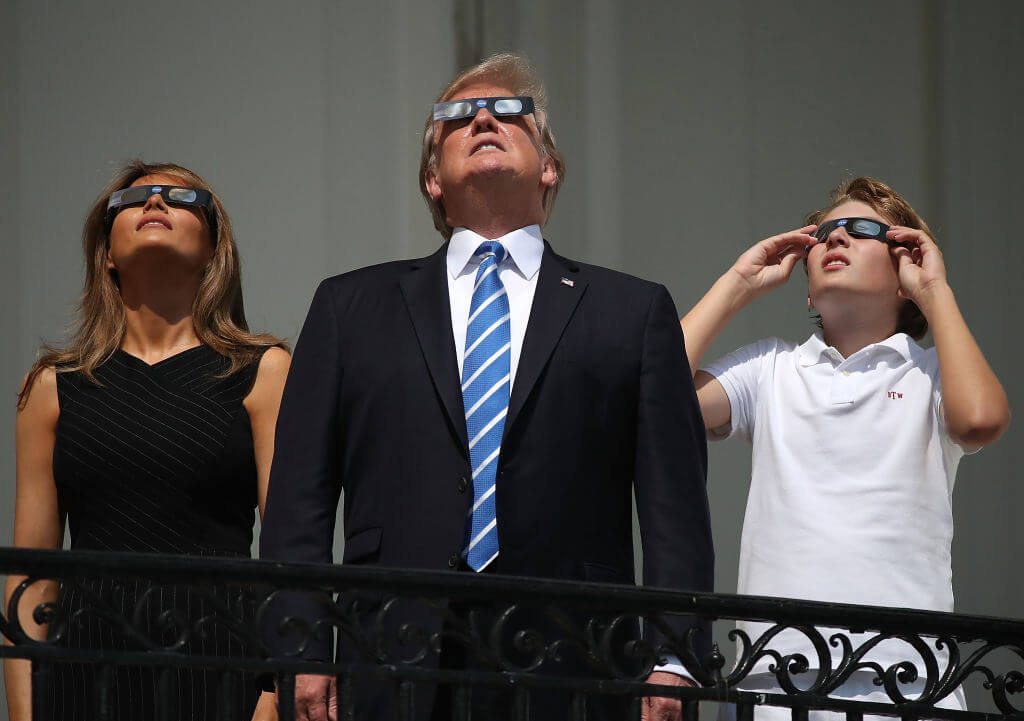Inmates sue prison for right to watch solar eclipse, claiming it’s a religious experience
“Religion is the only hobby allowed in prison, so naturally the inmates make the most of it,” said Rabbi Joe Hample, who served for two years as chaplain at a supermax prison

First Lady Melania Trump, President Donald Trump and their son, Barron Trump watch the 2017 eclipse at the White House. Photo by Getty Images
Update: On Thursday, April 4, 2023, the case was dismissed and the lawyers issued this statement: “We are pleased that, in response to our lawsuit alleging religious discrimination, New York State has entered into a binding settlement agreement that will allow our six clients to view the solar eclipse in accordance with their sincerely held religious beliefs.” The original story appears below…
Jeremy Zielinski, Inmate No. 16A3601 at Woodbourne Correctional Facility in New York, has been prepping for months for Monday’s solar eclipse. Zielinski, an atheist serving time for rape, requested in January special permssion to watch the once-in-a-generation eclipse, claiming it is a religious experience. Under federal law, prisons are generally required to allow inmates to practice their religion. Officials approved the request and even offered to provide glasses so he could protect his eyes while watching the eclipse.
Then other inmates found out, and asked to watch the eclipse, too. But last month the state’s Department of Corrections and Community Supervision, citing security concerns, issued a lockdown order for the three hours surrounding the eclipse Monday afternoon. That means the roughly 1,000 inmates at Woodbourne will be in their cells when the moon provides a partial solar eclipse over the prison. (There was no such rule in New York during the 2017 partial eclipse.)
Now Zielinksi and five other inmates — including another atheist, a Muslim, a Baptist, a Seventh-Day Adventist and two Santeria practitioners — have filed a last-minute class action lawsuit against corrections department, saying their constitutional right to practice their religion is being violated.
Many religions recognize the significance of eclipses. Scripture and other religious writings allude to an eclipse during the crucifixion of Jesus and the death of the son of the prophet Muhammad. In Judaism, the Torah, the Prophets and the Talmud all discuss eclipses. The Lubavitcher Rebbe viewed solar eclipses as a time for increasing prayer and introspection. “Even at totality, there is a penumbra around the moon, and before and after rays of light explode outward,” writes Seth Rogovoy in the secret Jewish history of eclipses. “These ‘rays of hope’ remind us that God is always with us, even in the darkness.”
Sharon Steinerman of the Alston & Bird law firm, is one of the attorneys representing the inmates. “We do not have any named Jewish plaintiffs,” she said. But it’s a class action lawsuit on behalf of all state prisoners “with sincerely held religious beliefs that April’s solar eclipse is a religious event that they must witness and reflect on to observe their faiths. So, to the extent there are Jewish prisoners with those beliefs, we are litigating on their behalf as well.”
This is the first time in nearly a century that New York state has been in the path of a total solar eclipse, and the next one won’t come until 2099. The next solar eclipse in the U.S. is 2044, and will only reach totality in three states — Montana, North Dakota, and South Dakota.
This is not the first time Zielinski, 40, has sued prison officials. He took them to court in 2011, while under federal probation supervision, for forbidding him from decorating the outside of his house for Halloween and answering the door if kids came trick or treating due to a prior child pornography conviction.
A Jewish chaplain weighs in
“Religion is the only hobby allowed in prison, so naturally the inmates make the most of it,” said Rabbi Joe Hample, who served for two years as a chaplain at Pelican Bay, a supermax prison in Crescent City, California. “In prison, they take away all your individuality, so if you can think of a way to have your individuality, you grab it.”
Hample said that during his tenure he knew many prisoners who claimed to be a part of the Native American religion because it allowed them to use tobacco. “Who am I to assess Native American authenticity?” Hample asked. “That was not heavily covered at Hebrew Union College.”
Hample said inmates would often claim to be part of a religion he had never heard of. “The only test I could come up with was to Google it,” he said.
Hample lives in Morgantown, West Virginia, where there will be a 94.7% near total eclipse. Asked what he will be doing at 3:18 p.m. Monday when the eclipse reaches its local peak, Hample laughed. “I’m not planning on watching it.”
















